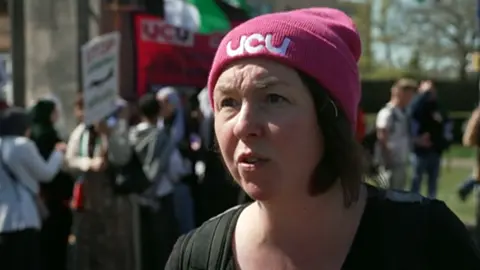Protest students feared for university futures
 Brum Action 4 Palestine
Brum Action 4 PalestineTwo students have questioned a university's commitment to freedom of speech after they feared expulsion over a pro-Palestinian protest.
Mariyah Ali and Antonia Listrat were cleared by a misconduct hearing last week, but said the possibility of expulsion had affected their studies and applications for postgraduate positions.
The pair had been accused of breaking the university's student code of conduct by disrupting a business meeting and "behaving in an intimidating and disorderly manner" towards staff on 22 May.
The University of Birmingham said it had a "strong and longstanding commitment to freedom of speech and academic freedom" backed by its code of conduct.
It added that it was important that the university was "a safe and welcoming space for all our community".
The two students have a history of pro-Palestinan activism on campus, with the University of Birmingham previously taking legal action against Ms Ali and others over encampments last summer.
The demonstrations were in response to Israel's full-scale invasion of Gaza, following Hamas's cross-border attack in October 2023 that saw about 1,200 people killed and 251 others taken hostage.
 bhamliberatedzone
bhamliberatedzoneMisconduct charges were brought against the two final-year students after they had joined a group wearing t-shirts painted with red marks and chanting slogans outside a meeting about the university's investments last May.
At the time, protesters claimed they were peacefully trying to encourage the university to financially divest from companies linked to Israel.
However, staff members inside the meeting reported that it was a "frightening" experience for them.
One witness statement heard by the disciplinary panel read: "The whole incident did not feel peaceful, it felt deliberately disruptive."
During their hearing, the two students said they had argued that the university was in violation of the United Nations' guidelines on freedom of speech.
"It's not lawful to have a policy that requires you to authorise protest," said Ms Listrat.
She added that the policy was harmful as it required a named organiser and advance notice, among other requirements.
 bhamliberatedzone
bhamliberatedzoneThe students said they had faced wider discrimination over their views.
"Muslim students are very pro-Palestinian," said Ms Ali.
"I think it goes back to the wider issue of Islamophobia on campus and conflating pro-Palestinian activism with something that is dangerous and intimidating."
While waiting for the hearing Ms Listrat said she believed she was under surveillance, after security came up to her and told her that she was "banned from campus", despite that not being the case.
"I recently did a Subject Access Request and found that the university has kept a folder on me with CCTV footage," she said.
 Brum Action 4 Palestine
Brum Action 4 PalestineBoth students also said they were disappointed at their Guild of Students, with Ms Ali labelling their lack of support as "shambolic".
"It was easier to get support from the United Nations than our own student union," Ms Listrat said.
While unable to comment on individual cases, the Guild of Students said support was available to students involved in disciplinary processes through its trained Advice team.
"Our elected officers have worked with the University to uphold students' legal right to protest on campus and represent the student body," a spokesperson added.
UoB2 campaign
After receiving letters notifying them of the disciplinary process, the students said they feared expulsion.
"There was this uncertainty about whether either of us were going to graduate," said Ms Ali.
"We're doing our dissertations, final-year exams and assignments. I could not even apply for certain postgrad opportunities."
To fight against proceedings, the pair set up a campaign, called UoB2, in January in a bid to attract publicity for their position.
A petition supporting them attracted more than 2,000 signatures and was endorsed by several key figures, including former Labour leader Jeremy Corbyn.
Allow Instagram content?
They had also enlisted the help of the European Legal Support Centre, which put forward legal submissions to the misconduct panel and argued that the university had a legal duty to protect freedom of speech.
Less than a month before the hearing, Ms Listrat was elected as the incoming Guild of Students President and she said she was worried she might lose her position.
"I had a personal crisis at that point," she said.
"If I was going to be expelled and lose my job, it would've impacted my life in many different ways."
'Really disgusted'
While the hearing took place inside the university library last Monday, a rally including staff, students and members of the local community gathered outside to show their support.
Ellen Shobrook, president of the Birmingham branch of the University and College Union (UCU), said the trade union had already tried to open a dialogue with the university about its Freedom of Speech Policy.
"I feel really disgusted," she told the BBC while the hearing was taking place.
"The students are being punished in a disproportionate and repressive way, which has a chilling effect on the ability for people to peacefully protest."

In response to Ms Ali and Ms Listrat's claims, the university said it rejected "any suggestion that our Freedom of Speech Code of Practice is unlawful".
"It was developed with expert internal and external legal advice, and has also been relied upon in a High Court judgment," a spokesperson said.
The university added that its disciplinary process was "fair and objective" and involved a panel unconnected to the original investigation.
It also rejected any suggestions of Islamophobia.
"Our university community includes staff, students and visitors from a wide range of backgrounds and beliefs, a spokesperson said.
"We will not tolerate any form of discrimination or racism, including Islamophobia.
"We maintain regular discussions with a range of student and staff representatives to listen to their views and ensure that they feel supported."
Update 16 April: In a previous version of this story Antonia Linstrat said the university's code of conduct required 21 days' notice for a protest on campus, rather that 14 days, as the policy outlines.
Follow BBC Birmingham on BBC Sounds, Facebook, X and Instagram.
